沪教牛津版牛津版七年级下册英语知识点总结Unit1People around us
沪教版英语七下知识点UNIT1(沪教版)
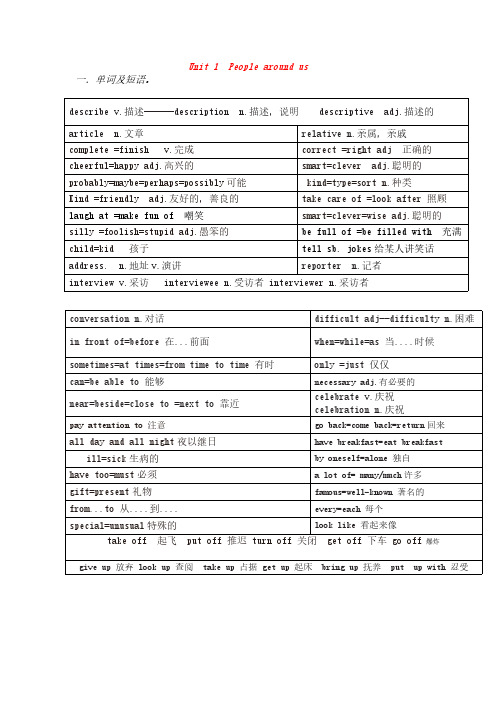
Unit1People around us一.单词及短语。
describe v.描述———description n.描述,说明descriptive adj.描述的article n.文章relative n.亲属,亲戚complete=finish v.完成correct=right adj正确的cheerful=happy adj.高兴的smart=clever adj.聪明的probably=maybe=perhaps=possibly可能kind=type=sort n.种类Kind=friendly adj.友好的,善良的take care of=look after照顾laugh at=make fun of嘲笑smart=clever=wise adj.聪明的silly=foolish=stupid adj.愚笨的be full of=be filled with充满child=kid孩子tell sb.jokes给某人讲笑话address.n.地址v.演讲reporter n.记者interview v.采访interviewee n.受访者interviewer n.采访者conversation n.对话difficult adj--difficulty n.困难in front of=before在...前面when=while=as当....时候sometimes=at times=from time to time有时only=just仅仅can=be able to能够necessary adj.有必要的near=beside=close to=next to靠近celebrate v.庆祝celebration n.庆祝pay attention to注意go back=come back=return回来all day and all night夜以继日have breakfast=eat breakfast ill=sick生病的by oneself=alone独自have too=must必须a lot of=many/much许多gift=present礼物famous=well-known著名的from...to从....到....every=each每个special=unusual特殊的look like看起来像take off起飞put off推迟turn off关闭get off下车go off爆炸give up放弃look up查阅take up占据get up起床bring up抚养put up with忍受一.阅读1.People around you.(p1)1“people”表示“人”时,是集体名词,可理解为“人们”,词尾不能加“s”,且不能表示单个人,可以说“some people,many people”,但不可以说“a people,one people”.但是,people表示“民族”时,有单复数之分。
新沪教版英语初初一下册Unit 1 People around us知识讲解

沪教版初中英语一年级下册精编试题及知识点汇总学生姓名:班级:学号:Unit 1 People around us词句精讲精练词汇精讲1. patient(1) patient作形容词,意为“耐心的”,后常接with 或of。
例如:He’s a very patient man. 他是个很有耐心的人。
We must be patient with children. 我们对孩子们要有耐心。
(2) patient作名词,意为“病人”。
例如:The doctor is very patient with his patients. 那位医师对病人十分耐心。
2. forgetforget作动词,意为“忘记”。
与remember意思相反,其过去式为forgot,过去分词为forgot或forgotten。
例如:Don’t forget his name. 不要忘记他的名字。
【拓展】(1) forget to do sth.表示“忘记要做某事”,事情还没有做。
例如:Don’t forget to turn off the light when you leave. 离开时别忘记关灯。
(2) forget doing sth.表示“忘记曾经做过某事”,事情已经做过了。
例如:He forgot going to Shanghai with his parents when he was five years old.他忘记五岁时曾经和父母去过上海。
3. smellsmell作名词,意为“气味”。
例如:What is your favorite smell? 你喜欢哪种气味呢?【拓展】(1) smell作实义动词,意为“闻”。
例如:Please smell the soup! 请闻闻这汤!(2) smell作系动词,意为“闻起来”,后接形容词作表语。
例如:Dinner smells good. 晚饭闻起来很香。
【注意】smell作系动词时不同于系动词be,它们在变疑问句或否定句时不能简单地提到主语之前或加not,而是要通过助动词do/does/ did等来帮助实现。
七年级英语下册Unit 1 People around us(深圳市沪教牛津版)(学生版)
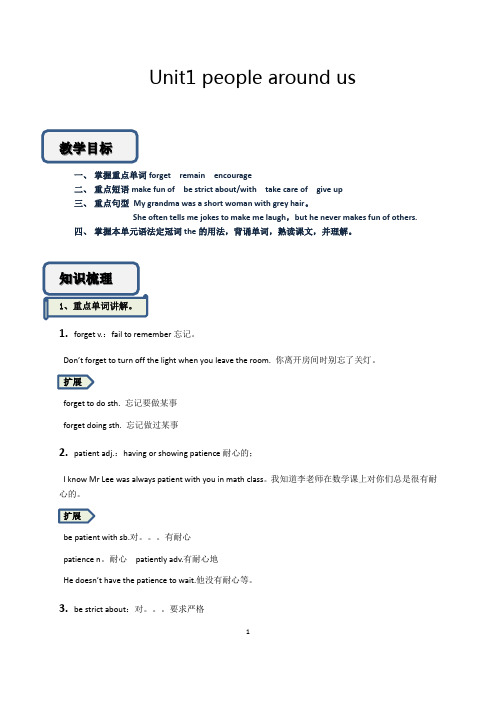
Unit1 people around us一、掌握重点单词forget remain encourage二、重点短语make fun of be strict about/with take care of give up三、重点句型My grandma was a short woman with grey hair。
She often tells me jokes to make me laugh,but he never makes fun of others.四、掌握本单元语法定冠词the的用法,背诵单词,熟读课文,并理解。
1.forget v.:fail to remember忘记。
Don’t forget to turn off the light when you leave the room. 你离开房间时别忘了关灯。
forget to do sth. 忘记要做某事forget doing sth. 忘记做过某事2.patient adj.:having or showing patience耐心的;I know Mr Lee was always patient with you in math class。
我知道李老师在数学课上对你们总是很有耐心的。
be patient with sb.对。
有耐心patience n。
耐心patiently adv.有耐心地He doesn’t have the patience to wait.他没有耐心等。
3.be strict about:对。
要求严格1be strict with sb:对某人要求严格My father is very strict with me about my study. 我父亲对我的学习很严格。
4.encourage v:make sb feel brave enough or confident enough to do sth. 鼓励encourage sb to do sth 鼓励某人做某事encouragement n 鼓励The teacher encouraged me to have a try. 老师鼓励我再试一试。
2019年沪教牛津版英语七年级下册 Unit 1 People around us Period 4附答案
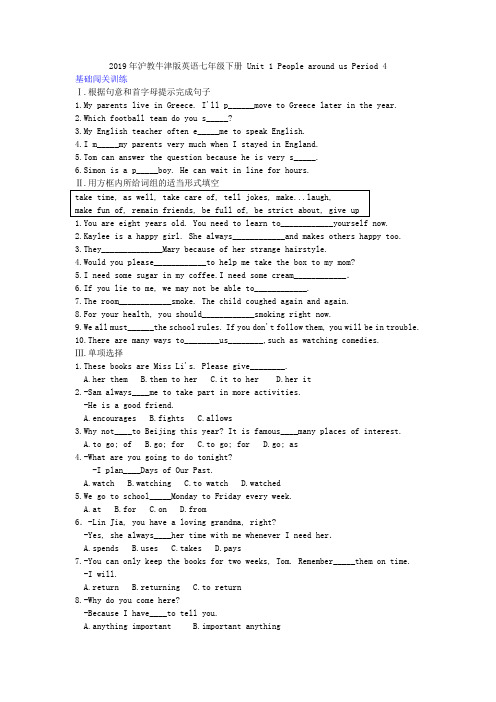
2019年沪教牛津版英语七年级下册 Unit 1 People around us Period 4基础闯关训练Ⅰ.根据句意和首字母提示完成句子1.My parents live in Greece. I'll p______move to Greece later in the year.2.Which football team do you s_____?3.My English teacher often e_____me to speak English.4.I m_____my parents very much when I stayed in England.5.Tom can answer the question because he is very s_____.6.Simon is a p_____boy. He can wait in line for hours.1.You are eight years old. You need to learn to____________yourself now.2.Kaylee is a happy girl. She always____________and makes others happy too.3.They______________Mary because of her strange hairstyle.4.Would you please____________to help me take the box to my mom?5.I need some sugar in my coffee.I need some cream____________.6.If you lie to me, we may not be able to____________.7.The room____________smoke. The child coughed again and again.8.For your health, you should____________smoking right now.9.We all must______the school rules. If you don't follow them, you will be in trouble.10.There are many ways to________us________,such as watching comedies.Ⅲ.单项选择1.These books are Miss Li's. Please give________.A.her themB.them to herC.it to herD.her it2.-Sam always____me to take part in more activities.-He is a good friend.A.encouragesB.fightsC.allows3.Why not____to Beijing this year? It is famous____many places of interest.A.to go; ofB.go; forC.to go; forD.go; as4.-What are you going to do tonight?-I plan____Days of Our Past.A.watchB.watchingC.to watchD.watched5.We go to school_____Monday to Friday every week.A.atB.forC.onD.from6.-Lin Jia, you have a loving grandma, right?-Yes, she always____her time with me whenever I need her.A.spendsesC.takesD.pays7.-You can only keep the books for two weeks, Tom. Remember_____them on time. -I will.A.returnB.returningC.to return8.-Why do you come here?-Because I have____to tell you.A.anything importantB.important anythingC.something importantD.important something9.Most of the villagers took part in the Dragon Boat races_____9:00 a.m._____the morning of June 18.A.at; inB.at; onC.on; inD.on; on10.The number of the students____over 2,000 in our school.A.isB.areC.beD.Were能力提升训练Ⅰ.从所给的六个句子中选出五个补全对话A:Look !1________B:She is my sister.A:What does she like?B:2________A:Is the man next to her your father?B:3________A:4________B:He is a doctor.A:By the way, what does your mother do?每位同学都有自己喜欢的老师,请你根据下列提示,以My teacher为题介绍一位你喜欢的老师。
沪教牛津版初中英语七下教材短语句型知识点汇总

沪教牛津版初中英语七下教材短语句型知识点汇总Unit 1 People around us读:读三个学生关于他们身边人物的文章。
听:一个女孩跟地奶奶谈论她们的亲戚的事情。
语法:学会如何使用定冠词the。
说:学会部分音素的发音。
谈论你喜欢的人。
写:写一篇关于你所爱的人的短文。
A.短语归纳1.XXX跟某人谈论某事2.buy sth。
for sb.(=buy sb。
sth.)为某人买物3.give sb。
sth。
(=give sth。
to sb.)给某人某物4.as well除……之外;也5.take care of照顾;照料6.two years ago两年前7.tell XXX讲笑话8.make fun of取笑9.be good at=do well in擅长10.be full of充溢,装满11.lots of许多12.make friends with与……交朋友13.save…from (doing)拯救……免于……14.from…to…从……到……15.be XXX对某事要求严格16.look like看起来像17.go to work上班18.all day and all night通宵达旦19.XXX在某方面帮助某人20.hard work辛苦的工作21.the number of……的数量22.first name名23.middle name中间名st name姓25.XXX sb跟或人说某事.26.in the world在天下上27.study hard努力研究28.play table XXX打乒乓球29.give sb。
support给或人撑持30.write down写下31.look after照顾32.give sb。
a lot of hope给某人很多希望33.in the sky在空中st night昨天晚上35.a visit to……之旅36.play a computer game玩电脑游戏初一下册37.play the guitar弹吉他38.play XXX打篮球39.the man in the purple suit穿紫色西装的人40.have to不得不41.every weekend每一个周末42.XXX…带或人去……B.句型归结1.It XXX time to do sth.破费工夫做某事2.make sb。
新沪教版英语初初一下册Unit 1 People around us知识讲解

沪教版初中英语一年级下册精编试题及知识点汇总学生姓名:班级:学号:Unit 1 People around us词句精讲精练词汇精讲1. patient(1) patient作形容词,意为“耐心的”,后常接with 或of。
例如:He’s a very patient man. 他是个很有耐心的人。
We must be patient with children. 我们对孩子们要有耐心。
(2) patient作名词,意为“病人”。
例如:The doctor is very patient with his patients. 那位医师对病人十分耐心。
2. forgetforget作动词,意为“忘记”。
与remember意思相反,其过去式为forgot,过去分词为forgot或forgotten。
例如:Don’t forget his name. 不要忘记他的名字。
【拓展】(1) forget to do sth.表示“忘记要做某事”,事情还没有做。
例如:Don’t forget to turn off the light when you leave. 离开时别忘记关灯。
(2) forget doing sth.表示“忘记曾经做过某事”,事情已经做过了。
例如:He forgot going to Shanghai with his parents when he was five years old.他忘记五岁时曾经和父母去过上海。
3. smellsmell作名词,意为“气味”。
例如:What is your favorite smell? 你喜欢哪种气味呢?【拓展】(1) smell作实义动词,意为“闻”。
例如:Please smell the soup! 请闻闻这汤!(2) smell作系动词,意为“闻起来”,后接形容词作表语。
例如:Dinner smells good. 晚饭闻起来很香。
【注意】smell作系动词时不同于系动词be,它们在变疑问句或否定句时不能简单地提到主语之前或加not,而是要通过助动词do/does/ did等来帮助实现。
2015-2016学年牛津沪教版初中英语七年级下同步课堂笔记Unit_1_People_around_us
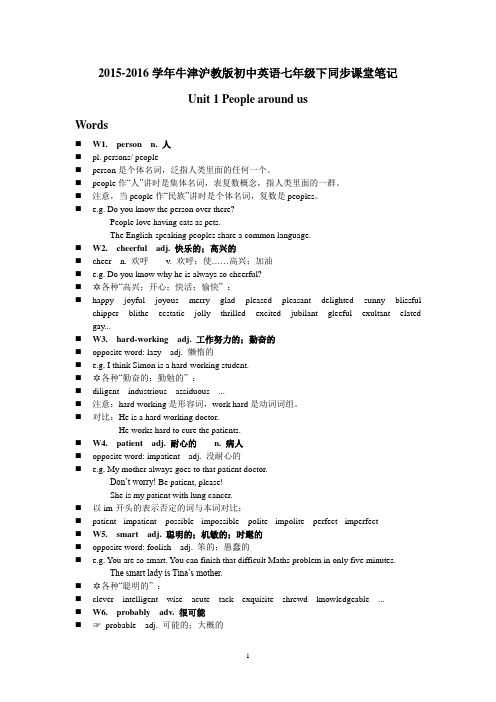
2015-2016学年牛津沪教版初中英语七年级下同步课堂笔记Unit 1 People around usWords⏹W1. person n. 人⏹pl. persons/ people⏹person是个体名词,泛指人类里面的任何一个。
⏹people作“人”讲时是集体名词,表复数概念,指人类里面的一群。
⏹注意,当people作“民族”讲时是个体名词,复数是peoples。
⏹ e.g. Do you know the person over there?People love having cats as pets.The English-speaking peoples share a common language.⏹W2. cheerful adj. 快乐的;高兴的⏹cheer n. 欢呼v. 欢呼;使……高兴;加油⏹ e.g. Do you know why he is always so cheerful?⏹✲各种“高兴;开心;快活;愉快” :⏹happy joyful joyous merry glad pleased pleasant delighted sunny blissfulchipper blithe ecstatic jolly thrilled excited jubilant gleeful exultant elated gay...⏹W3. hard-working adj. 工作努力的;勤奋的⏹opposite word: lazy adj. 懒惰的⏹ e.g. I think Simon is a hard-working student.⏹✲各种“勤奋的;勤勉的” :⏹diligent industrious assiduous ...⏹注意:hard-working是形容词,work hard是动词词组。
⏹对比:He is a hard-working doctor.He works hard to cure the patients.⏹W4. patient adj. 耐心的n. 病人⏹opposite word: impatient adj. 没耐心的⏹ e.g. My mother always goes to that patient doctor.Don‟t worry! Be patient, please!She is my patient with lung cancer.⏹以im-开头的表示否定的词与本词对比:⏹patient - impatient possible - impossible polite - impolite perfect - imperfect⏹W5. smart adj. 聪明的;机敏的;时髦的⏹opposite word: foolish adj. 笨的;愚蠢的⏹ e.g. You are so smart. You can finish that difficult Maths problem in only five minutes.The smart lady is Tina‟s mother.⏹✲各种“聪明的” :⏹clever intelligent wise acute tack exquisite shrewd knowledgeable ...⏹W6. probably adv. 很可能⏹☞probable adj. 可能的;大概的⏹ e.g. You are probably right.It was probably her most popular song.⏹✲各种“很可能;或许;也许” :⏹maybe likely perhaps possibly ...⏹W7. forget v. 忘记⏹☞forget - forgetting forget - forgot - forgotten⏹opposite word: remember v. 记得⏹☃玩转forget:⏹forget后接人或事、物,表示“忘记某人/某事/某物”:⏹ e.g. He forgot the name of his primary school class teacher.⏹forget后接to do sth表示“忘记去做某事(还没做)”(forget to do sth):⏹ e.g. Don‟t forget to reply to Jane in the morning.⏹forget后接doing sth表示“忘记做过某事(做完了)”(forget doing sth):⏹ e.g. He forgot buying that scarf in Paris.⏹☃玩转remember:⏹remember后接人或事、物,表示“记得某人/某事/某物”:⏹ e.g. Mary remembered her middle school English teacher.⏹remember后接to do sth表示“记得去做某事(还没做)”⏹(remember to do sth):⏹ e.g. You should remember to reply to Jane in the morning.⏹remember后接doing sth表示“忘记做过某事(做完了)”⏹(remember doing sth):⏹ e.g. I remember seeing the man somewhere.⏹W8. smell n. 气味v. 闻;嗅⏹ e.g. Many people don‟t like the smell of durians.⏹☃玩转smell(作动词):⏹(1)smell作行为动词时,后面直接跟宾语:⏹ e.g. Smell the perfume. Do you like it?⏹(2)smell作系动词时,后接形容词来修饰主语:⏹ e.g. The meat smells nice, but tastes terrible.⏹✲各种系动词:⏹be [am, is, are](状态系动词);keep, rest, remain, stay, lie, stand(持续系动词);seem, appear,look(表象系动词);feel, sound, smell, taste(感官系动词);become, grow, turn, fall, get, go, come, run(变化系动词);prove, turn out(终止系动词)...⏹W9. care n. 照顾v. 关心;关注;在乎⏹ e.g. Baby dogs and cats need a lot of care.⏹The only thing he cares about is money.⏹☃玩转care:⏹careful adj. 仔细的;小心的careless adj. 粗心的;漫不经心的carefully adv. 仔细地;小心地carelessly adv. 粗心地;草率地carefulness n. 仔细;慎重carelessness n. 粗心大意;草率⏹✲各种care:⏹(1)care about sth 担心/在乎某事 e.g. She doesn‟t care about money.⏹(2)take care of sb 照顾某人 e.g. I‟ll take care of myself.⏹(3)care for sb 照顾某人(病人) e.g. She cared for her father in his dying year.⏹(4)care for sth 想要某物 e.g. Would you care for a drink?⏹(5)care to do sth 愿意做某事(用于礼貌性话语)= be willing to do sthe.g. Would you care to wait here, sir?⏹W10. miss v. 想念,怀念;错过;过失n. 小姐;女士(用于未婚的女性,放在姓之前,要大写)⏹ e.g. I miss my classmates in my primary school.⏹He missed the ball.⏹Are you Miss Huang?⏹W11. joke n. 玩笑v. 说笑话;开玩笑⏹ e.g. He is full of fun. He always tell jokes to make us laugh.⏹I didn‟t get the joke.⏹They are laughing and joking together.⏹☃玩转joke:⏹play a joke on sb 开某人玩笑have a joke 说笑话;开玩笑⏹Are you joking (me)? = Are you kidding (me)? 你在(和我)开玩笑吗?⏹W12. laugh v. 玩笑⏹☞laughter n. 笑;笑声⏹注意:laugh中的的gh发/ f /音。
沪教牛津版英语七年级下册Unit1学习要点汇总
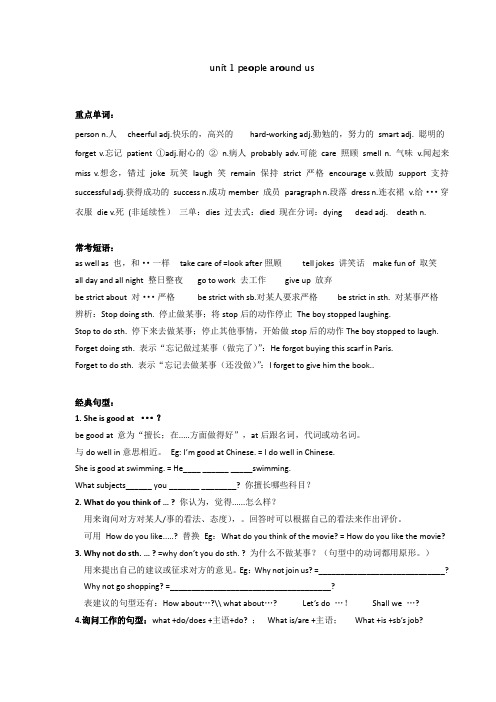
unit 1 people around us重点单词:person n.人cheerful adj.快乐的,高兴的hard-working adj.勤勉的,努力的smart adj. 聪明的forget v.忘记patient ①adj.耐心的②n.病人probably adv.可能care 照顾smell n. 气味v.闻起来miss v.想念,错过joke 玩笑laugh 笑remain 保持strict 严格encourage v.鼓励support 支持successful adj.获得成功的success n.成功member 成员paragraph n.段落dress n.连衣裙v.给···穿衣服die v.死(非延续性)三单:dies 过去式:died 现在分词:dying dead adj. death n.常考短语:as well as 也,和··一样take care of =look after照顾tell jokes 讲笑话make fun of 取笑all day and all night 整日整夜go to work 去工作give up 放弃be strict about 对···严格be strict with sb.对某人要求严格be strict in sth. 对某事严格辨析:Stop doing sth. 停止做某事;将stop后的动作停止The boy stopped laughing.Stop to do sth. 停下来去做某事;停止其他事情,开始做stop后的动作The boy stopped to laugh. Forget doing sth. 表示“忘记做过某事(做完了)”:He forgot buying this scarf in Paris.Forget to do sth. 表示“忘记去做某事(还没做)”:I forget to give him the book..经典句型:1. She is good at ···?be good at 意为“擅长;在.....方面做得好”,at后跟名词,代词或动名词。
- 1、下载文档前请自行甄别文档内容的完整性,平台不提供额外的编辑、内容补充、找答案等附加服务。
- 2、"仅部分预览"的文档,不可在线预览部分如存在完整性等问题,可反馈申请退款(可完整预览的文档不适用该条件!)。
- 3、如文档侵犯您的权益,请联系客服反馈,我们会尽快为您处理(人工客服工作时间:9:00-18:30)。
沪教牛津版牛津版七年级下册英语知识点解析Unit1 People around us重点短语:1. hard-working adj. “勤勉的,努力工作的”作定语work hard 动副结构短语2. be patient with sb. “对某人有耐心“3. take (one’s) time to do sth.“花费时间做某事”It takes sb. some time to do sth. =sb. spend some time on sth./(in) doing sth.“做某事需花费……时间”4. like doing sth. “喜欢做某事”(表喜欢、爱好某种经常的或习惯性的活动)like to do sth. “喜欢去做”(表喜欢、爱好某种特定的或具体的活动)Eg. I like visiting friends on Sundays and I like to visit Tom this Sunday.like sb. to do sth.“喜欢某人做某事” Eg. We all like him to play the guitarlike 介词 Eg. She looks like her father.6. always 频率副词“总是”be动词或助动词之后,行为动词之前Eg. Our teacher is always kind to us.“一直;(将)永远;老是(用于进行时)”Eg. I will always remember your words.She is always moving things around.He has always been the tutor.always>usually>often7. probably adv. “大概;很可能”;adj. “可能的,大概”Eg.I’ll probably be a doctor in the future.It is probable to finish the job before dark.8. in the world 世界上all over the world = throughout the world 全世界9. never adv.是ever 的否定形式,用于加强否定语气。
位于be动词或助动词后,行为动词前;语气比not强。
反义词alwaysnot adv. “没有,不”——表示否定,用在助动词或情态动词后no adv. adj. “没有的;不许的;一点也没有;不”——用于否定回答nothing 不定代词“没有动词;没有事情”Eg.We never use it.I don’t know.It’s no use doing it.I have nothing for you.10. as well 副词短语,位于句尾,有时与连词and或but搭配使用。
“也,又,还有,同样的”同义词:also, tooEg. He speaks English and Spanish as well= He speaks English and he speaks Spanish, too.= He speaks English and he also speaks Spanish.He is a worker and a poet as well.too adv. ——一般位于句尾或插入语放在句中,只用于肯定句,口语中与also通用 also adv. ——用在句中,一般放在be动词或助动词之后,行为动词之前as well as 用作介词“还有,不但……而且……”在A as well as B 的结构中,语意重点在A,不在B。
Eg. He thinks the other way is better. I do, too.He also likes English. = He likes English, too.He can speak Spanish as well as English.11. take care of = look after 照顾,照看12. miss sb. very much 非常想念某人miss 用作动词时,还有“漏掉,错过(机会);丢掉”13. to make me laughmake fun of = laugh at 取笑……,嘲弄……14. make a study of = studymake sb./sth. +形容词(作宾补),“使……怎么样”Eg.It made me happy.We are doing our best to make our country more beautiful.make sb. Do sth. 使某人做某事Eg. His jokes made us all laugh.15. be good at 擅长……= do well in在某方面做的好反义表达:be poor atEg. He is good at Japanese. = He does well in Japanese.They are very good at playing football. = They do very well in playing football.16. remain 作系动词后接名词或形容词“一直保持,仍然(处于某种状态)”17. be full of 充满……与be filled withadj. V.The basket is filled with apples.= The basket is full of apples.18. be strict about sth. 对某事要求严格be strict with sb. 对某人要求严格be strict in sth./doing sth. 在(做)某事上要求严格Eg. Our teacher is always strict with us.We must be strict about this problem.Our teacher is very strict in her work19. support 不可数名词“支持”Eg. Please give me some support.I want to get some support from my friends.20. give up 动副短语“放弃”不可带宾语可跟名词或动名词作宾语Eg.the problem is too difficult. I shall give it up.lHe has given up smoking. = He has stopped smoking.21. successful adj. “成功的” success — n. Succeed — v.Eg. His operation is very successful.He is a successful businessman.Nothing succeeds like success. 一事成功,事事顺利。
22. phone sb. = call sb. “打电话”23. ask about sth.(sb.) “询问有关某事(或某人)的情况”ask after sb. “问候某人(的健康)”ask for sth. “要求得到某物或要求与某人见面”ask to do sth. “要求或请求做某事”ask sb. to do sth.“要求某人做某事”Eg. They all ask after you.He asked for some water.A Mr Smith is asking for you.They asked me for help.He asked her for her address.He asked to go with us.He asked us to wait for him at the gate.24. take notes = make notes“做笔记,做记录”note与take 构成固定搭配必须用复数形式重点语法:冠词冠词分为不定冠词(a, an),定冠词(the),和零冠词。
I. 不定冠词的用法:II. 定冠词的用法:III. 零冠词的用法:即时演练:()1.——What does Mr Black do?——He is ______English teacher.A /B theC anD a( ) 2. ____ train goes faster than _____bus.A.A; aB. A; theC.The;the D The;a( ) 3.It’s early. We have half _____ hour to go.A anB aC the D/( ) 4.Evening came, we could see ____ old man sitting under ____ tall tree.A an; /B the;/C a; theD a; the( ) 5. We have ______ lunch in _____ middle of ____ day.A /;a;/B the;/;anC a;the;/D /;the;the( ) 6.——Which one do you want?——______ blue one,I think.A.TheB. AC. AnD.不填( ) 7.—Does Jim have _______ ruler?—Yes,he has _______ .A.an;some B.a;one C.a;/ D.any;one( ) 8.There is _______ old bike._______ old bike is Mr Zhao's.A.an ;The B.the;An C.a;The D.the;The( ) 9. _______ apple a day keeps the doctors aw ay.A.The B.A C.An D.Two( ) 10.—How many books do you have?—I have _______ book.That's _______ English book.A.a;an B.a;one C.one;an D.one;one( ) 11.At that time Tom was _______ one-year-old baby.A.a B.an C.the D./( ) 12. _______ tiger is _______ China.A.The;a B.A;the C.The;from D.The;the( )13.We can't see _______ sun at _______ night.A.the;the B.the;/ C.a;/ D./;/( )14. _______ useful book it is!A.What an B.How a C.What a D.What( )15.One afternoon he found _______ handbag.There was _______ “s”on the corner of _______ handbag.A.a;an;the B.a;a;the C.an;an;an D.the;a;a( ) 16. _______ old lady with white hair spoke _______ English well at _______ meeting.A.An;an;a B.The;/;an C.The;/;a D.The;/;the( ) 17. _______ Great Wall is _______ longest wall in the world.A.A;a B.The;the C.A;the D.The;a( ) 18. _______ new bridge has been built over Huangpu River.A.The;a B.A;/ C.A;the D.An;the( ) 19. _______ woman over there is _______ popular teacher in our school.A.A;an B.The;a C.The;the D.A;the( ) 20.He used to be _______ teacher but later he turned _______ writer. A.a;a B.a;the C./;a D.a;/。
